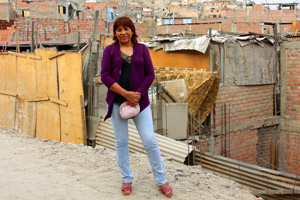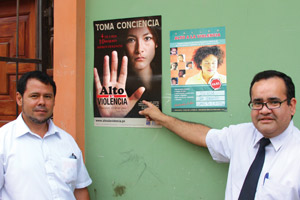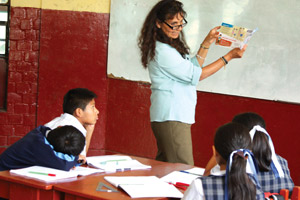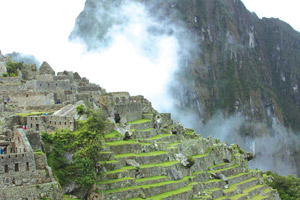A New Day in Peru

The Peruvian Bible Society (PBS) has made significant progress in combating the problem of domestic violence in Peru, legally and spiritually. American Bible Society colleagues visited Peru this year and saw the passion the PBS leaders bring to their work and the healing that is taking place. God's Word is reaching Peruvians in places of deepest need.
The causes of domestic violence stem from a generally acceptable machismo culture, which allows an average of four out of 10 women to endure a level of violence that has gone unstopped for generations, according to PBS. At least 10 new women daily suffer violence in Lima. In 2011, 168 women were killed as a result of domestic violence. To date, some 15 women have died this year. A variety of predictable risk factors include poverty (many families live in one room with no privacy), sexual abuse, addictions and low education. Another cause is that many parents compete for power and control over the household, and some fathers just leave. An additional cause is a misinterpretation of the Bible. This is where the Bible Societies in Peru and other Latin American countries are stepping in to work with church communities to help think anew about long-held assumptions, including: the man is the head of the household; women are to submit without question and forgive 70 times seven; separation and divorce are not options; and women should “carry their cross” and pray harder. And some pastors don't like being told their assumptions need refinement.
Alto a la Violencia, or “Stop the Violence,” is a media campaign and a workshop organized by PBS that promotes the prevention of domestic violence and helps heal people through churches in Lima.
Far Reaching Consequences
In December 2011, a new law was passed — thanks in large measure to the work of PBS General Secretary Roberto Miranda. Roberto brings to the Bible Society a deep passion for truth and justice, as well as a mature legal career and a constant presence in the media. For the first time, the law includes real punishment for perpetrators.
The new law hinged on a case from two years ago when single mother Elizabeth Alana's boyfriend threw boiling water at her, disfiguring her face and body. After visiting her in the hospital, Roberto took on her case pro bono, and now the boyfriend is in prison for eight years — the first time someone has received such a lengthy jail sentence for domestic violence.

Now, after her workday of sewing, Elizabeth travels with Samuel Asenjo, a PBS leader, and visits churches in poverty-stricken areas throughout Lima, a vast city of 8 million people. Together they run Stop the Violence workshops. These begin with a three-minute video on Elizabeth's experience, and then Samuel introduces Elizabeth, who gives her testimony about how God is healing her inside and out. “I hope that my sharing will encourage some of you to come forward with your own stories, ” said Elizabeth. Then, Samuel shows a presentation on the characteristics of an aggressor and the biblical guidelines on how to proceed. He explains the roots of the misunderstandings that have come about from the Bible, starting with Genesis 2.18-25. “Why did God create woman? To be a companion, not a maid,” said Samuel.
Pablo Gutierrez, PBS programs director, said, “When I heard about Samuel's work in biblical masculinity, I knew he would be perfect for us. Samuel has a passion for helping people see that the Bible promotes mutual submission, interdependence and cooperation between men and women.”
The seven-week workshops use a Scripture-based workbook that is healing women, men and children caught up in this epidemic. Pablo says, “The deeper we go, the need gets larger than expected. At present we are covering Lima, but there are other urban areas that need this program.” So far, 10,000 people have received this training.

Protecting Schoolchildren
In Lima, some 60 percent of students in public schools experience violence at home. Sometimes it's not a parent but an uncle or cousin who gets a child to “keep our secret,” thereby manipulating and confusing a child into silence. Some adults offer gifts to enforce the silence, and some children begin to mistake abuse for affection.
Elba Avalos is an advocate for appropriate gestures of love at home and at school. Samuel Asenjo hired Elba to educate schoolchildren about domestic violence. She gets in front of a class and gives a lively and fun demonstration of good and bad forms of touch, playacting with the kids and teachers. She walks them through a Scripture-based workbook to help them internalize God's views on healthy love.
“People think sexual abuse has increased, but this is not true — it's just being reported now,” Elba said. She also explains that what we hear about is usually only 10 percent of what is going on.

Rural Bible Engagement
In the villages around Cusco, southeast of Lima —where one travels to ascend Machu Picchu — PBS uses a different tactic to combat domestic violence. Many people don't get past second grade because they are expected to help out on the farm. This means they may have a very basic ability to read, but virtually no reading comprehension — a skill that is developed in later schooling. The norm has been that thousands of cases of domestic violence go unreported because people don't know how to speak up for themselves. Also, they are insecure about their chances of surviving outside of the established structure because they can't read and navigate the world.
A program called Leer para Vivir, or Read to Live, is in its pilot year in Peru, using easy-language Scripture-based workbooks. The average age of those learning to read now is 50, and 70 percent are women. The strategy is to use the church as a channel to reach the whole community. These materials are still in development because they are being translated in Quechua (called “the tongue of heaven”), and church communities are giving feedback so that the Bible Societies can help tailor the lessons for their needs.
The Peruvian Bible Society is sharing its learnings from the Stop the Violence and Read to Live programs with other Latin American Bible Societies. The goal is to engage people with the most accurate and appropriate materials possible. Roberto Miranda says, “Thank you for your prayers and your deep love for the Peruvian people.”
Thanks to the support of our faithful financial partners, American Bible Society has been engaging people with the life-changing message of God’s Word for more than 200 years.
Help us share God's Word where needed most.
Sign up to stay in touch with how God is changing lives with his Word!








